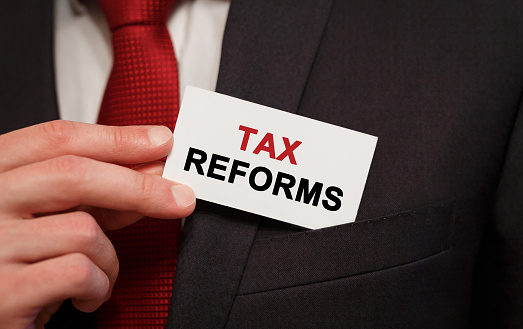
©Michail_Petrov-96/ISTOCK/THINKSTOCK
As GOP efforts towards comprehensive tax reform take shape, it’s clear that tax changes are afoot that will significantly impact businesses. Simultaneously, shifts in tax practices are already underway on the state and local level, as well as the international stage. Regardless of the size or location of the business, tax executives are planning for whatever may come.
Planning for uncertainty with domestic reform
When BDO conducted its annual Tax Outlook Survey in March of 2017, 100 percent of the tax executives surveyed believed significant tax reform was likely under President Trump. While setbacks ranging from the delayed passing of the American Healthcare Act to infighting on Capitol Hill quickly threw that assumption into question, the president recently announced his reform framework. If successfully executed, it would mark the most significant updates to the federal tax code since the 1980’s.
As the tax reform plan continues to take shape, tax executives are watching closely to see what points from their reform “wish list” make it into the final plan. Unsurprisingly, according to the survey, topping the list is the desire for a reduced corporate tax rate. Should the president’s plan be passed in its current form, the corporate tax rate will be lowered from 35 percent to 15 percent—a huge tax savings for companies, especially large multinationals.
While a lower corporate tax rate does seem likely, many are skeptical that it will actually land at 15 percent. During a March 28 webinar attended by over 500 tax professionals from around the world, nearly two-thirds of participants (63 percent) predicted the corporate rate will stay in the 20s, and 34 percent of respondents predicted it will fall somewhere between 20 and 24 percent—still a large discount for businesses of any size. Only six percent predict the tax rate will fall between 15 and 19 percent.
Think globally, tax locally
Just as tax reform has many implications domestically, proposals like the shift to a territorial tax system are especially critical to multinationals. The desire for incentives to repatriate foreign earnings and to shift the current international tax system from a worldwide system to a territorial one—in which only income originating within the U.S. would be taxed in the U.S.—also rank high on tax executives’ list of priorities. Over one-third of the international tax execs who participated in our March webinar note that they would like to see the U.S. move towards a territorial tax system.
While domestic reform dominates the news cycle, tax professionals—especially those part of multinational organizations—are well aware of the international reforms underway, led by the Organization for Economic Co-operation and Economic Development (OECD). In fact, international tax planning ranks chief (35 percent) among planning concerns for 2017. Further, among the 15 action items laid out by the OECD, those around transfer pricing generate the most concern for tax executives, trailed by interest deduction and financial payments.
It’s no surprise planning for implementation is a priority, as many action items are already in progress. Some country-by-country (CbC) reporting rules became effective as of January 1, 2017. Despite anxieties, a majority of surveyed tax executives are in good shape as 91 percent indicate they should be able to meet the initial CbC reporting deadline of December 31, 2017.
Tax executives get SALT-y
Zeroing in on the big picture, it’s important not to overlook state and local tax considerations. Oftentimes large-scale reform is a slow, cumbersome task, taking years to arrive at a final plan. One area where tax executives can find certainty is in their own backyard.
As states aim to make themselves as attractive to companies as possible, the dance between tax incentives and incoming revenue becomes a delicate one. Tax executives pay close attention to these incentives to help lighten their burden and maintain growth. According to BDO’s survey almost all (91 percent) of those surveyed rely on income or franchise tax credits and exemptions, 88 percent take advantage of sales tax refunds and exemptions, and 86 percent factor in property tax abatements and exemptions.
In addition, even before the president revealed plans to lower the overall corporate tax rate, five states lowered their corporate income tax rates, while several others consider similar proposals. Just as many companies contemplate international expansion, many ponder domestic growth as well. While 32 percent of survey participants plan to enter new geographic markets in the U.S. in 2017, almost half (48 percent) are keeping an eye on franchise tax credits when deciding where to plant new roots.
Planning for change
From Alaska to the European Union, businesses are planning for tax changes for the near and long-term. Whether you’re determining next steps on BEPS implementation within your multinational company, or are trying to predict what may actually come to fruition with President Trump’s plan for reform, it’s most important to stay informed on all tax systems impacting your company.
Tax reform on all levels is a long process. Each day D.C.’s objections are changing, and no matter what may happen, knowledge will be your greatest tool to stay on top of it all.
Paul Heiselmann is National Managing Partner at BDO. Matt Becker leads BDO USA’s National Tax Office and is the Managing Partner for the Central Region.